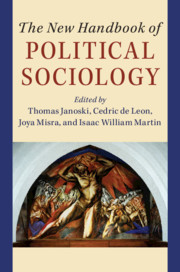Book contents
- The New Handbook of Political Sociology
- The New Handbook of Political Sociology
- Copyright page
- Dedication
- Contents
- Tables
- Figures
- Contributors
- Acknowledgments
- Introduction
- I Theories of Political Sociology
- II Media Explosion, Knowledge as Power, and Demographic Reversals
- III The State and Its Political Organizations
- IV Civil Society: The Roots and Processes of Political Action
- 22 The Challenges of Citizenship in Civil Society
- 23 Social Movements
- 24 Political Parties
- 25 Machine Politics and Clientelism
- 26 The Good, the Bland, and the Ugly
- 27 The Politics of Economic Crisis
- 28 The Influence of Public Opinion and Advocacy on Public Policy
- 29 Nationalism
- V Established and New State Policies and Innovations
- VI Globalization and New and Bigger Sources of Power and Resistance
- Index
- References
29 - Nationalism
The Modern Motive-Force
from IV - Civil Society: The Roots and Processes of Political Action
Published online by Cambridge University Press: 22 February 2020
- The New Handbook of Political Sociology
- The New Handbook of Political Sociology
- Copyright page
- Dedication
- Contents
- Tables
- Figures
- Contributors
- Acknowledgments
- Introduction
- I Theories of Political Sociology
- II Media Explosion, Knowledge as Power, and Demographic Reversals
- III The State and Its Political Organizations
- IV Civil Society: The Roots and Processes of Political Action
- 22 The Challenges of Citizenship in Civil Society
- 23 Social Movements
- 24 Political Parties
- 25 Machine Politics and Clientelism
- 26 The Good, the Bland, and the Ugly
- 27 The Politics of Economic Crisis
- 28 The Influence of Public Opinion and Advocacy on Public Policy
- 29 Nationalism
- V Established and New State Policies and Innovations
- VI Globalization and New and Bigger Sources of Power and Resistance
- Index
- References
Summary
Not a day has gone by in these past several years without nationalism appearing in the headlines. Let us, for the sake of this chapter, limit ourselves to the period since 2008, the year of the Beijing Olympics. The event signified Chinese nationalism’s coming of age; it was in no uncertain terms and very publicly presented to the world. The world, unaware that Chinese nationalism existed at all, was caught by surprise, from which it still, over a decade later, cannot quite recover. The rise of nationalism in China was an extremely important development in the history of nationalism in general. It opened a new page: the spread of an essentially Western form of consciousness beyond the limits of its original, monotheistic civilization, or the actual globalization of nationalism.
- Type
- Chapter
- Information
- The New Handbook of Political Sociology , pp. 761 - 784Publisher: Cambridge University PressPrint publication year: 2020
References
- 1
- Cited by

